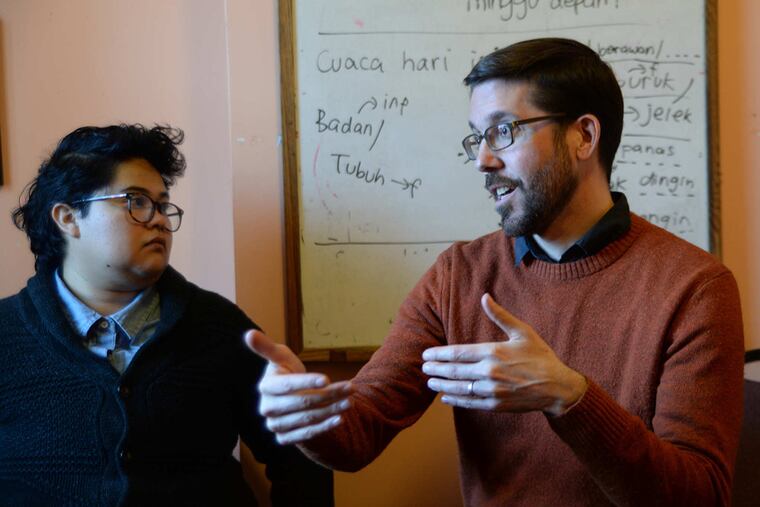New Sanctuary Movement has been on a dead run since Trump's election
This week NSM made headlines when it helped an undocumented mother and her four children take sanctuary inside a church to avoid deportation to Mexico.

This month marks the 10th anniversary of the New Sanctuary Movement of Philadelphia, a frontline defender of immigrants, but no one has scheduled a celebration.
It's been way too hectic.
Last week, NSM, as it's known, made headlines when it helped an undocumented mother and her four children take sanctuary inside the Church of the Advocate in a bid to avoid deportation to Mexico.
But the fact is that since the day President Trump was inaugurated in January, the interfaith group has been on a dead run: mounting protests, engaging new partners, and providing trustworthy legal assistance to newcomers regardless of their immigration status.
"It's been intense. Not just the amount of work, but the emotions," said Peter Pedemonti, NSM's cofounder and director.
The hard part? Having to fight on several fronts at once. The organization has lost people — two were taken away during the federal "Operation Safe City" raids on undocumented immigrants in September.
A good part? The growth in support and commitment. This year, nine new churches signed on as member congregations, raising the total to 28.
The biggest challenge has been to push forward, to make positive progress and not merely react to the cascade of immigration actions flowing from the Trump administration:
Banning visitors and immigrants from six mostly Muslim countries, ending the DACA program that protected undocumented immigrants who were brought here as children, reducing the number of refugees allowed into the country, eliminating Temporary Protected Status for nearly 50,000 migrants from Nicaragua and Haiti who now must return to troubled homelands.
Of course, to people who support tougher immigration laws and enforcement, the people who run agencies like NSM are the bad guys, the ones who shield "illegal aliens" who should be arrested and deported.
"Providing any kind of care to illegal immigrants — outside of emergency medical care, which should be available to everyone — is a clear violation of federal law," said Dave Ray, director of communications for the Federation for American Immigration Reform, a Washington nonprofit that seeks to reduce immigration. "Hiding yourself behind organized religion, as recently happened in Philadelphia, does not exempt anyone from laws that apply to everyone else."
Six NSM staffers work out of a warren of offices in Kensington, just off the Huntington stop on the El. About 80 percent of the agency's $230,000 budget comes from individual donors, the rest from bigger backers like the Samuel S. Fels Fund and the Philadelphia Foundation.
NSM serves mostly Latino and Indonesian communities. In the last year its caseload has doubled to about 100 people. Some need legal help. Some need prayerful support. Others want to connect to a larger community that is experiencing the same hopes and fears.
Pedemonti founded the group with eight or nine other advocates, including priests and rabbis, to oppose raids and deportations that were happening even a decade ago. A first-generation citizen, the son of English and Italian immigrants, he's been active in social-justice movements since 2001 and previously worked with the House of Grace Catholic Worker, which operates a free medical clinic and offers hospitality to immigrants and refugees.
Today, at NSM, faith remains a cornerstone. And the overall goal is still big and formidable: to end injustice against immigrants, express radical welcome for all people, and uphold values of dignity and justice in practice and in policy.
"Their power is in the love and support that they can and do give," said Cathryn Miller-Wilson, executive director of HIAS Pennsylvania, which provides legal services to immigrants. "In these incredibly terrible times, I am a little jealous of their ability, as non-lawyers, to really be out there."
In October, days after the federal raid took 107 undocumented Philadelphia residents into custody, New Sanctuary leaders led 40 demonstrators onto the sidewalk outside the Center City offices of Immigration and Customs Enforcement, known as ICE.
No one cursed or jeered the half-dozen federal and local officers who watched from across the street. Instead, the protesters built a sukkah on the sidewalk, a small hut to mark the Jewish festival of Sukkot, which celebrates hospitality and sanctuary.
That vision of community is central to NSM. A key program is "accompaniment," that is, making sure that an immigrant who must go to court does not go alone.
"With the new administration, there's been a nervousness about showing up even to traffic court," said Jazmín Delgado, NSM's accompaniment coordinator.
The number of volunteers offering to provide accompaniment — that is, moral support, a friendly face, a prayer — has grown to 200.
That job has become fraught in this country as federal agents show up outside courtrooms and arrest people on immigration charges. Last month, dozens of defense lawyers staged a protest outside a Brooklyn courthouse after an undocumented man was arrested in a hallway.
Pedemonti compares the tumult of the last year to the turbulent, rising waters that swept up Noah's Ark. But what's important, he said, is the flood wasn't the whole story. The story at heart is one of new beginnings.
"Change takes a while," Pedemonti said. "Movements take a while. … You need to keep that end goal in sight, that there is a time when we'll look back at this and say: 'I can't believe this used to happen. That we used to deport people. That we used to lock up mothers and fathers.' "